Azerbaijan confirmed as next year’s Cop host
Hello – Ajit here taking over the live blog from my colleague Bibi. Several sources have now confirmed that Azerbaijan will host next year’s UN climate summit.
The quest to find a host for Cop29 was fraught because of war. Under UN rules, it is Eastern Europe’s turn to take over the rotating presidency. But the group must unanimously decide which of the countries does the job. Russia had blocked EU countries from hosting, Azerbaijan and Armenia were blocking each other’s bids, and most of the rest of the group would struggle, onlookers thought, to stump up the money and facilities needed to host such a large conference.
But on Thursday, as one of a handful of concrete steps towards a peace treaty, Armenia and Azerbaijan put out a joint statement that agreed Armenia would withdraw its bid and support Azerbaijan’s. “The Republic of Armenia and the Republic of Azerbaijan share the view that there is a historical chance to achieve a long-awaited peace in the region.”
Choosing Azerbaijan as a host will do little to quell protests from climate activists that Cops have been partly captured by fossil fuel interests. Much like this year’s host, the country of 10 million people on the border of Eastern Europe and Western Asia relies heavily on digging up fuels that heat the planet when burned. Oil and gas production accounted for nearly half of the country’s GDP and over 92.5% of its export revenue last year, according to the US government’s International Trade Administration.
Key events
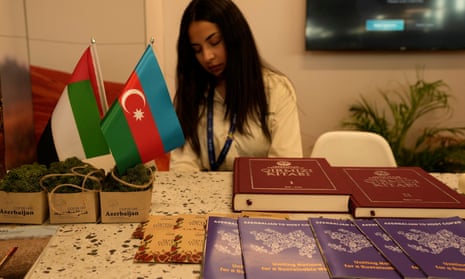
The decision to make Azerbaijan – a repressive country whose economy depends heavily on fossil fuels – the host of Cop29 has not proven popular.
Svitlana Romanko, an environmental lawyer and founder of Ukrainian campaign group Razom, which calls for a full embargo of Russian fossil fuels, said: “We are not surprised at all that oil dictatorships have created a bloody trade union trying to sustain their fossil fuel regimes… We are upset how the democratic leaders and UN institutions let them do so.”
“Azerbaijan is a small scale Russia,” she added, pointing to the former’s war against Armenia and gas trade with Russia’s Gazprom.
Christian Kroll, CEO of green search engine Ecosia, said: “Yet another authoritarian, undemocratic oil state running COP. We’ve seen over the last few years total devaluation of this climate conference – and with it – the UN’s role as a meaningful arbiter when it comes to abating the worst consequences of the climate crisis.”
The announcement comes after months of tensions over which country in the UN’s Eastern Europe grouping would host the conference. Russia had blocked any EU country’s bids and many of the other contenders lacked infrastructure and funds to host such a large event.
“It is good that the uncertainty over who will host Cop29 is over,” said Kaveh Guilanpour, vice president of the Centre for Climate and Energy Solutions. “It means that plans can now be made coming out of Cop28 for the key years of 2024 and 2025 – when new climate targets have to be tabled by all countries.”
Pressure on Sultan Al Jaber to be the ‘honest broker’ of a fossil fuel phase out

Damian Carrington
Whether the 198 countries at Cop28 in the UAE agree to call for a “phase out” of fossil fuels is the single biggest issue at the UN climate summit, according to Lisa Fischer at the E3G thinktank – and the pressure is rising on Cop28 president, Sultan Al Jaber, to act as the “honest broker” between the countries as they thrash out the issue.
The first week of Cop28 saw significant support for a phase out – as opposed to a phase down – of fossil fuels, she said. “But you’ve also seen a lot of pressure on Al Jaber on his potential conflict of interest and the need for him to really focus on delivering a high ambition outcome.”
Al Jaber is the CEO of the UAE’s state oil company, Adnoc, which is planning a major phase up of oil and gas production. Scientists are clear that the expansion is incompatible with getting emissions to net zero by 2050.
The latest negotiating text offers several options for a phase out. “I think Al Jaber has heard that [pressure] in the sense that he’s made sure some progressive options are on the table, and that what countries have said, largely speaking, is included,” said Fischer.
“But his role doesn’t end there,” she said. “He will need to continue to ensure that there’s scope for an ambitious outcome and that any attempts to water down the language on fossil fuel phase out isn’t just passed through” in the negotiating room.
Leaked letters from the oil cartel Opec to its member nations, reported by the Guardian on Friday, showed the extreme level of concern from petrostates over a potential fossil fuel phase out decision: it would mean “pressure against fossil fuels may reach a tipping point with irreversible consequences”, the Opec head warned. He urged the countries to “proactively reject any text or formula that targets energy, i.e. fossil fuels, rather than emissions”.
Fischer said: “The Opec letters are significant in the sense that they show that there are interests continuing to try to water down the language on fossil fuels. It’s important for Al Jaber to draw the baseline. He needs to distinguish himself from this group of countries, otherwise he cannot be seen as an honest broker.” The UAE is a core member of Opec.
Nina Lakhani
Fair and equitable finance for climate adaptation is a matter of life and death for the African continent, but talks at Cop28 so far have failed to deliver, the chief negotiator for the African group has warned.
Adaptation is being discussed as part of the global stocktake (GST), the assessment of where the world is on delivering the commitments made in the 2015 Paris agreement. The long-awaited global goal on adaptation (GGA) – a collective commitment proposed by the African group in 2013 and established under the Paris agreement – to drive political action and finance for adaptation on the same scale as mitigation, is also due to be completed in Dubai.
But progress has been slow, and countries have yet to agree on measurable targets and guidelines, let alone come up with a workable framework and finance agreements that fairly reflect the burden on developing countries especially in Africa. It is unclear whether the promised outcome will be delivered, as countries have so far failed to agree on the draft text.
“We are in an adaptation emergency and our vulnerable populations are suffering. The world must act and take steps to close the adaptation gap with quality financing so that Africans do not get left behind. This must be at the centre of the Cop28 outcome,” said Ephraim Mwepya Shitima, a Zambian who is head of the African group of negotiators.

Damian Carrington
Why is the phase-out of fossil fuels the biggest flashpoint at Cop28? Why could prepositions such as “out” and “down” change how hot the planet gets? What is “abatement” and why should I care?
My colleague Damian Carrington has the answers to these and the other big questions that you may be asking about this powerful – but ever-confusing – climate summit.
Nina Lakhani
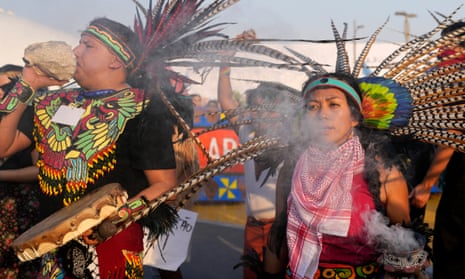
Hundreds of delegates marched to demand climate justice and to call for an immediate ceasefire in Gaza.
“Climate justice is a right not just for the rich and white,” sang the crowd as negotiators from more than 180 countries fight over climate finance and access to adaptation measures. In an emotionally charged protest peppered with traditional drumming, smoke ceremonies and dancing, Indigenous people from the Brazilian Amazon and Guatemalan highlands marched alongside Cameroonian grassroots activists and peasant leaders from Pakistan. It’s the first public protest to take place in the UAE in well over a decade.
Rev Rachel Taber-Hamilton, an Episcopal priest from the United States, said: “I’m here today as a delegate from the Episcopal church. I think it’s the power of the people. The communities need to come together because what we have in common is we’re fed up of all of us being harmed, and the dominant culture of economics being very happy to make us victims.”
Isvilaine da Silva Conceição from the Laboratory of the Climate Observer said: “I’m here today to be together with all the civil society people who are fighting for our lives, our planet, every single day. So we are here together to spread this world for everybody who’s not here at Cop that we need to do something right now. We don’t have any more time.”
The sun began to set during a minute of silence to honour the thousands of Palestinian civilians who have been killed in the last two months – including 70 journalists and many of their families – which ended with calls to “end the occupation” and “no one is free until Palestine is free”.

Patrick Greenfield
Here in Dubai, environment ministers from around the world are busy discussing the wording of a phrase on fossil fuels that will have major implications for the future of humanity.
After the early success on the loss and damage fund, the focus of Cop28 is squarely on how hard and how quickly the world’s governments decide to eliminate fossil fuels to limit global heating.
It will define the success of the summit, many negotiating teams acknowledge, but the path ahead is uncertain.
Should fossil fuels be phased out or phased down? Should the world commit to eliminating fossil fuels or just fossil fuel emissions? What is the appropriate role of carbon capture? Should we be eliminating unabated fossil fuels or all of them? Should we try to cut down their consumption or production?
Ministers must find adequate answers to all of these questions and more to reach a final agreement in the coming days. The gossip at Cop28 is now about country red lines: what does Saudi Arabia really think about fossil fuels? What does India need to deliver on a just transition? What will the Africa group say about fossil fuels if adaptation targets are weak?
The hard negotiations are just getting started. Meanwhile, Cop28 president Sultan Al Jaber is taking it all in his stride. He was signing a football at the entrance to the site this afternoon.
Generals and minions: the social media bot army boosting Cop28

Damian Carrington
Almost 2,000 bots have been identified boosting Cop28 on X. They were found by Marc Owen Jones, an expert on social media disinformation and the Middle East, who believes the “greenwash” army is “likely connected to the UAE or a UAE-aligned entity”.
Jones said there is a clear division of labour between 22 “generals”, who post the content, and about 1,900 “minions” who amplify the post by liking them. These are divided into cells, so each post by a general is not simply liked by the entire 1,900 army of fakes – that’s clever(ish), says Jones.
One general is a blue-tick, AI-generated, beauty called @bint_jumeiraah, who likes to post pictures of Cop28 president Sultan Al Jaber walking hand-in-hand with people like Saudi Arabia’s energy minister or UAE astronauts. Another account, @sheikhasoltan, posted on “Dr Sultan Al Jaber stresses the “carbon capture” technologies play a crucial role in our journey to climate neutrality … transforming challenges into opportunities”.
Jones, at Hamad Bin Khalifa University in Qatar, said: “Many of the tweets are praising Cop28 president Sultan Al Jaber. Others praise the UAE and Cop28 in general. [At the moment], the network is tasked with promoting Cop28, the UAE and Al Jaber as good for the climate catastrophe.”
The bots were in action earlier this year as well, defending the controversial hosting of Cop28 by oil-rich UAE on X (formerly Twitter) and on Medium. As the Guardian reported in June, messages included that Al Jaber was “the ally the climate movement needs”. One account had an AI-generated profile picture, but text labelling the image as fake had not been cropped out.
A Cop28 spokesperson said: “Unfortunately, we have been contending with this issue for months. Any notion that the Cop28 presidency is connected to these latest bots is false. Just as [before], these accounts appear to be generated by outside actors. When we uncover such campaigns, we report them to X and, when necessary, engage with counsel on possible additional measures to counter the problem.”

Ruth Michaelson
Human rights groups have accused the UNFCCC, the UN body that oversees Cop, of censoring a protest on Emirati political prisoners earlier this afternoon.
Protesters including members of Amnesty International and Human Rights Watch expressed frustration with the UN after they received approval to hold a protest on Emirati political prisoners in the Blue Zone, the section of Cop28 that is administered by the UNFCCC. This space for potential protest is considered particularly precious at this Cop, due to the location in a country which essentially bans protest, and where the UNFCCC has already been accused of failing to clarity whether anyone protesting in areas outside the Blue Zone would be safe from draconian Emirati laws that impose large fines and jail time for dissent.
According to those present, after rights groups spent a week negotiating over permission to hold the protest in the Blue Zone and obtaining clearance regarding the number of political prisoners that would be mentioned and details of their cases, forcing the groups to pare down the number of political prisoners featured on protests in the demonstration and demanding that they also mention British-Egyptian political prisoner Alaa Abd el-Fattah in order to widen their criticism of arbitrary detention beyond the Emirates.

UNFCCC staff then approached the group minutes before the protest with repeated new sets of demands. These included obscuring the name and case details of political prisoner Mohamed al-Siddiq, a member of the so-called “UAE 94,” a large group of dissidents “convicted on trumped-up charges following an unfair mass trial,” according to Amnesty International.
“It was really shocking from the UN – it was completely absurd, almost petty the level of detail and the extent they went to in order to censor the names of Emirati political prisoners,” said Joey Shea of HRW. “This level of censorship is shocking especially after their statement in August saying this will be the most tolerant Cop ever, and is extreme from the UN even in the Blue Zone.”
She added: “There is no freedom of expression at this Cop.”
The UNFCCC provided approval to hold the protest in the Blue Zone last night, following a week of negotiations with rights groups. “It’s been very challenging,” said Shea, pointing to HRW’s efforts to cite the case of the Emirates’ most widely-known political prisoner, human rights defender Ahmed Mansoor who has been held in solitary confinement in the UAE since 2017.
“Twenty minutes before the action, the UN let us know we could only have one poster showing one political prisoner, and we chose Mohamed al-Siddiq. In negotiations this week they said we needed to limit the number of Emirati posters we displayed, and we needed pictures of Alaa Abd el-Fattah so that it didn’t specifically target the UAE. The compromise was that we would have t-shirts showing Ahmed Mansour, the cover of our report [on his case] and two posters of different Emirati political prisoners, per our understanding.”
“The UN had signed off on the poster we used, and we had chosen Mohamed al-Siddiq. Twenty minutes before the action started, we were forced to take duct tape and put it over the top of a section mentioning his unjust imprisonment and that their families had their citizenship revoked. They said some of the text underneath was still visible, so we had to fold the posters in half so that none of the text was showing,” she said.
UNFCCC staff reportedly returned repeatedly until minutes before the event to demand further changes to the posters and what text or images would be visible during the small demonstration.
Images of the event show the attendees, numbering 20 according to organisers, holding small posters of Mohamed al-Siddiq folded to obscure his name and any details of his case, while wearing t-shirts bearing Ahmed Mansoor’s face. The UNFCCC has been approached for comment about the protest.
A dozen countries led by the Netherlands have announced a stronger crackdown on fossil fuel subsidies, my colleagues Damian Carrington and Patrick Greenfield tell me.
Fossil fuels benefited from record subsidies of $13m a minute in 2022, according to the International Monetary Fund, despite being the primary cause of the climate crisis.
At a press conference in Dubai, Wopke Hoekstra, the EU’s climate commissioner, said: “It is time to end the anomaly of fossil fuel subsidies, which are holding us back.”
Canadian climate minister Steven Guilbeault urged countries to ditch subsidies sooner. “Phasing out inefficient fossil fuel subsidies around the world ensures that spending is aligned with climate ambition.”
The text of the declaration and the list of signatories has not yet been published but Canada, Antigua and Barbados and several European countries joined the Netherlands in making the announcement.
Christiana Figueres, who was UN climate chief when the landmark Paris agreement was signed in 2015, told a Guardian Live event on Wednesday: “My top choice [for action to phase out fossil fuels] is fossil fuel subsidy removal. We are still paying $7 trillion a year in global fossil fuel subsidies. If we just removed that and redirected that $7tn toward protecting humanity, we would be much, much farther ahead than where we are right now.”
The IMF analysis found the total subsidies for oil, gas and coal in 2022 were $7tn. That is equivalent to 7% of global GDP and almost double what the world spends on education. Countries have pledged to phase out subsidies for years to ensure the price of fossil fuels reflects their true environmental costs, but have achieved little to date.
Explicit subsidies, which cut the price of fuels for consumers, doubled in 2022 as countries responded to the higher energy prices resulting from Russia’s war in Ukraine. Rich households benefited far more from these than poor ones, the IMF said. Implicit subsidies, which represent the “enormous” costs of the damage caused by fossil fuels through climate change and air pollution, made up 80% of the $7tn total.

Patrick Greenfield
Middle-class fears of losing a high standard of living because of green policies is driving the rise of the far right across the world, the president of Colombia has warned.
In a wide-ranging interview with the Guardian at the Cop28 UN climate summit, Gustavo Petro, Colombia’s first leftwing president, said the world had to find carbon-free ways of being prosperous, and that his country’s rich biodiversity would be the basis of its wealth after phasing out fossil fuels.
The South American country has joined an alliance of states calling for a fossil fuel non-proliferation treaty, with Petro saying he was trying prevent the “omnicide of planet Earth”.
The 63-year-old former guerrilla fighter, who won power in 2022, said Brazil needed to “transform its mindset” on the Amazon to prevent its destruction. Petro has disagreeed with the Brazilian president, Luiz Inácio Lula da Silva, over the role of oil exploration in the world’s largest rainforest, which Petro has sought to rule out.
He said conserving the Amazon rainforest was a fundamental part of global climate action and that its importance was well understood by Colombians.
Colombia has become a leading voice at Cop28 in the first negotiations on whether to phase out fossil fuels, despite the country being a significant producer of coal, oil and gas.
“All consumption that makes one feel comfort, prosperity and a high standard of living in the United States, Europe, and other societies, such as China, is based on intensive consumption of carbon. When decarbonisation is proposed, that basis falls out. Of course it’s difficult to present an alternative,” Petro said.
Nina Lakhani
Hundreds of delegates gathered in the far corner of the Cop28 B zone amid lots of UN police for a tightly-regulated march for climate justice.
The marchers called for a ceasefire in Gaza and chanted: “Climate justice is a human rights issue.” Among the country officials spotted were delegates from Canada, Sudan, Jordan, Brazil and Sweden.
Asad Rehman, climate justice campaigner and executive director of War on Want, said: “Powerful countries have been pressuring the UN to stop us calling for a ceasefire. But there is no better place than a UN space to call for a ceasefire, when it was at the UN that the world said “never again” to genocide.”
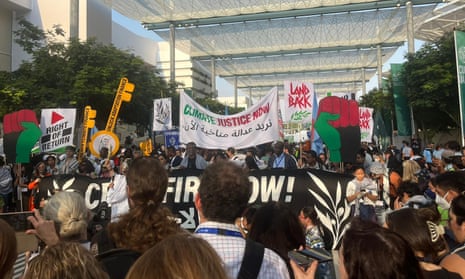
It’s worth noting that in Glasgow – the first time the UN was so heavily criticised for restricting civil society voices – tens of thousands of people marched in cities across the UK to demand climate justice. The UAE does not allow such public dissent and the UN is imposing its own restrictions.
The chant “from the river to the sea, Palestine will be free” – a reference to the land between the Jordan River, which borders eastern Israel, and the Mediterranean Sea to the west – has been banned at the march by the UN. Palestinians claim it is a freedom slogan that rejects Zionism. Israel has called it antisemitic.
Tasneem Essop, who leads the international campaign group Climate Action Network, said the pressure to restrict the protests calling for a ceasefire had not come from the UAE.

Helena Horton
On a nature-themed day of Cop, the Guardian can reveal that there are no obligations for English landowners to meet the country’s nature targets.
UK environment secretary Steve Barclay has been making the rounds in Dubai today to champion the UK’s nature commitments. The government has made much of its leadership at the UN Biodiversity Summit Cop15 last year, where world leaders adopted a global “30 by 30” target to protect 30% of nature by 2030.
Ministers have now released England’s framework and terms of reference for how the country will meet the goal. It looks relatively weak, with no obligation for any landowner or land manager to sign up. Considering the majority of English land is privately owned, this is not encouraging. The document states: “New contributions to the 30 by 30 target will be made on a voluntary basis, and there is no obligation on landowners or land managers to participate. Contributing to the 30 by 30 target simply recognises where an area is already being effectively protected and managed for biodiversity conservation.
“Whilst any existing designation requirements (including nature or heritage designations) will continue to apply, new 30 by 30 contributions do not represent any new management requirements or designation. Landowners or land managers will be able to withdraw their contribution at any point if they wish.”
The framework makes it clear that ministers want to pursue a “bottom up” not a “top down” approach and that it is up to landowners to decide whether they want to meet the goal by turning over some of their land voluntarily for nature.
Perhaps they are hoping that the marine environment, which the government has more control over, will offset any lack of progress made on land. The document points out 40% of the oceans around the UK are Marine Protected Areas (though campaigners have said these protections are not worth the paper they are written on).
The government reiterated that it will act to create a new national park and national forests, and that it will be putting biodiversity net gain rules on developers to help meet the goal.
Currently, just 8.5% of England is protected for nature. Given that we only have six years left to meet the 2030 goal, the fact there are no obligations on those who own the land does not bode well. This is made clearer by the fact that almost all of the land that is protected (7.6%) is designated a Site of Special Scientific Interest (SSSI) – one of the few types that carries legal protections.

Damian Carrington
Mary Robinson has met Cop28 president Sultan Al Jaber in Dubai. It is a significant meeting, given that Al Jaber’s ill-tempered responses to the former UN climate envoy shortly before the summit caused uproar when revealed by the Guardian.
The pair agreed that there was “no time to waste delivering an ambitious outcome”, according to a post on X from The Elders, the group chaired by Robinson. The group renewed their call on the countries at Cop28 “to unequivocally commit to phasing out all fossil fuels, tripling renewables and ensuring a just transition”. The issue of a phase out is seen as the most critical single issue at Cop28.
Al Jaber had told Robinson on 21 November: “There is no science out there, or no scenario out there, that says that the phase-out of fossil fuel is what’s going to achieve 1.5C.” He also said: “Show me the roadmap for a phase-out of fossil fuel that will allow for sustainable socioeconomic development, unless you want to take the world back into caves.”
He later insisted at an emergency press conference that: “I have said over and over the phase-down and the phase-out of fossil fuel is inevitable. In fact, it is essential.” He also said: “I have incredible respect for Mary Robinson.”
The official Cop28 account on X (formerly Twitter) retweeted the post marking the meeting on Saturday. The account has also retweeted a post from the German foreign minister Annalena Baerbock calling for a fossil fuel phase out, perhaps signalling the Cop28 presidency’s intention to pursue agreement on the goal.
It is not enough to pretend that it‘s possible to phase out fossil emissions. It is about #PhasingOut fossil fuels. We are thankful that here at #COP28 new ambitious alliances are expanding, overcoming old climate divides. It’s about rallying around a common goal together.
— Außenministerin Annalena Baerbock (@ABaerbock) December 8, 2023
Azerbaijan confirmed as next year’s Cop host
Hello – Ajit here taking over the live blog from my colleague Bibi. Several sources have now confirmed that Azerbaijan will host next year’s UN climate summit.
The quest to find a host for Cop29 was fraught because of war. Under UN rules, it is Eastern Europe’s turn to take over the rotating presidency. But the group must unanimously decide which of the countries does the job. Russia had blocked EU countries from hosting, Azerbaijan and Armenia were blocking each other’s bids, and most of the rest of the group would struggle, onlookers thought, to stump up the money and facilities needed to host such a large conference.
But on Thursday, as one of a handful of concrete steps towards a peace treaty, Armenia and Azerbaijan put out a joint statement that agreed Armenia would withdraw its bid and support Azerbaijan’s. “The Republic of Armenia and the Republic of Azerbaijan share the view that there is a historical chance to achieve a long-awaited peace in the region.”

Choosing Azerbaijan as a host will do little to quell protests from climate activists that Cops have been partly captured by fossil fuel interests. Much like this year’s host, the country of 10 million people on the border of Eastern Europe and Western Asia relies heavily on digging up fuels that heat the planet when burned. Oil and gas production accounted for nearly half of the country’s GDP and over 92.5% of its export revenue last year, according to the US government’s International Trade Administration.
And also absent from Cop this year is our very own John Vidal, the Guardian’s wonderful environment editor who died in October.
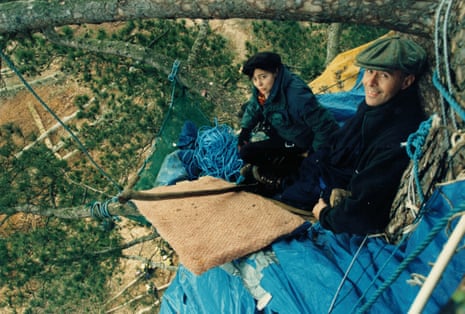
John reported on the environment for the Guardian for almost three decades until retiring in 2017, calling it “the greatest job on Earth”. He was an extraordinary journalist, but he was also an extrordinary colleague and friend and we’ve received many affectionate messages and stories about him, and some of the kind things he did.
His colleague, Paul Brown, told this wonderful story about John’s expenses:
Perhaps the best glimpse of his character came one morning in the office when tears were running down his cheeks. Asked what was the matter, he said a couple of months before he had been in Dhaka, the capital of Bangladesh, and visited the district with the highest death rate for young children. He had met two women and they told him that it was lack of fresh water that was causing infant mortality on a terrible scale. What they needed was a well, but they had no money to build one.
John said he had had the exact money they needed to build the well in his pocket in Guardian expenses, so he had given it to them with the stipulation that they send him an email when it was done. He was in tears because he had just received it: “Our children are no longer dying. Thank you.”
John, who was always famously behind with his expenses, was later that week chased to explain what he had spent in Bangladesh. At a colleague’s suggestion, he put “drinks for 5,000” and was amazed no one queried it.
And we’ve heard from many other writers and campaigners about his kindness and supportiveness.
We all remember John whisking around the halls of Cop, where he knew absolutely everyone. His long-standing colleague Damian Carrington also remembers how Vidal also often caused “good trouble”.
“His revelation of a leaked draft agreement at the UN climate summit in Copenhagen caused uproar, with developing countries reacting furiously to a text they saw as handing more power to rich nations. He was also imprisoned in the Faroe Islands while reporting on whaling.”
Do send us your memories and stories if you can! [email protected] or [email protected]
Am handing over to my colleague Ajit now – thanks for your messages so far!

Fiona Harvey
As the negotiations reach their final days, the Cop28 presidency is working closely with pairs of ministers to forge agreement on the most contentious aspects of the final decision. These negotiations are unusual in key respects: loss and damage was sorted early on, a massive contrast to the Cop27 talks last year in Egypt, when developed and developing countries were deadlocked over the issue until the rich world made a major U-turn in the final days, by agreeing that there could be a new standalone fund for loss and damage, rather than appropriating cash through existing channels.

Developing countries were, quite reasonably, furious that they had needed to expend so much energy to get that concession. Rich countries appeared at Cop28 to have learned from that chastening experience, and sorted out loss and damage on the very first day, in an attempt at building trust.
But a fund for loss and damage is not the only help developing countries need to cope with the climate crisis. Loss and damage funding is intended for the rescue and rehabilitation of countries stricken by the worst ravages of extreme weather. Separate, but related, is the issue of adaptation – how countries can be made more resilient to extreme weather so that, hopefully, there is less chance they will need to call on the loss and damage fund.
Adaptation has long been a neglected issue at these talks, and developing countries are now angry that rich countries have failed to provide enough funding for it. Most of the $100bn a year in climate finance that is meant to flow to the poor world goes to “mitigation” – helping to reduce greenhouse gas emissions. For several years, poor countries have called for the amount that goes to adaptation to be doubled.
If developed countries want to push forward with their plans for language on a phase out of fossil fuels, they will need to address the issue of adaptation for the poor.
While it may seem there is too little time left to bridge the massive gap between countries on the issue of a fossil fuel phase out, it is also unusual for the talks to have come to such a crunch point with so much negotiating time still to come. There are four days from Saturday to Tuesday, in which much can happen. In terms of bridging the vast gap between countries that want to phase out fossil fuels and countries that do not, this is too little time. But in terms of how the negotiations can go wrong from here, four days is a nail-biting stretch of eternity. The crucial skill in these long desolate hours in windowless, air-conditioned conference rooms will be to keep the phase-out option from being thrown out by the countries opposed to it.

All eyes are on Saudi Arabia, which as the Guardian revealed yesterday has been instrumental in trying to gather Opec countries to resist the phase-out calls. The host country, UAE, is a close ally of the Saudis. When the Guardian asked Sultan Al Jaber, Cop president, on the eve of the talks what engagement he expected from the Saudis, he was confident, saying the Saudi government had shown “positivity, engagement, receptive to my cause and my call to actions … towards achieving the most ambitious climate action outcome at Cop28”.
He added: “They have been cooperating and they’re coming with ambition. They have been engaging in a collaborative manner across all climate areas.”
As the talks grind on, Al Jaber’s task is to turn that positivity and engagement into tangible outcomes.
This year there are a few absent faces from the halls of Cop. Saleemul Huq was an extraordinary campaigner on climate change, and a powerful voice for under-represented groups for decades.
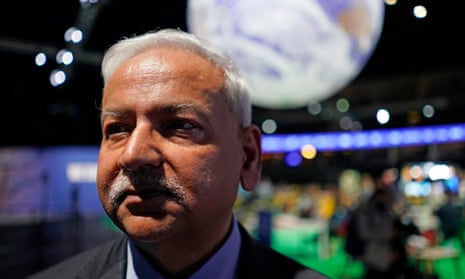
As my colleague Fiona Harvey wrote, he “devoted most of the latter part of a distinguished career to an impassioned fight to have the loss and damage suffered by the world’s poor recognised and remedied. As the founding director from 2009 of the International Centre for Climate Change and Development, in Bangladesh, he was one of the most prominent voices from the developing world on the climate crisis, an adviser to governments and a constant presence at the annual UN climate talks.”
“Huq attended the first “conference of the parties”, in Berlin in 1995, and was one of only a small number of people around the world to have been at every one since.
After years of Cops had produced little movement, Huq began to believe that issues of equity, social justice and the demands of poor countries were being sidelined. He was increasingly frustrated that smaller, developing countries were being taken for granted, or regarded as mere supplicants.
Another problem was that campaigners for economic development in poor countries were often hostile towards environmentalists, seeing their interests as opposed. Development groups felt that climate concerns were a distraction from, or inimical to, the overriding imperative to solve global poverty.
Huq sought to overcome these divisions and demonstrate that the climate crisis could only be solved if social justice, equity, the historical responsibilities of the rich world for their greenhouse gases, and the needs for development in the poor world were all recognised.
Along with other climate experts he began to work on “loss and damage”, which drew together these concerns and demanded that rich countries face up to the fact that the climate crisis was overwhelmingly caused by them, while the brunt of the suffering would be borne by the poorest.

